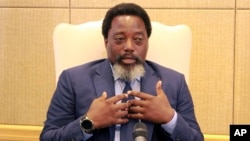Congo's President Joseph Kabila is stepping down after this month's election but he doesn't rule out seeking the post again in the future.
In an interview with The Associated Press, Kabila said he hopes to continue to be active in tackling the vast challenges that remain in this mineral-rich but "complicated nation." He said he has done what he could for Congo's benefit since taking office in 2001 after the assassination of his father, Laurent Kabila. But he said there is more to be done.
"Well, I am not going to rule out anything in life,"Joseph Kabila said. "As long as you are alive and you have ideas as strong as you have, a vision, you should never rule out anything.''
That kind of talk has worried Congo's opposition, which fears that Joseph Kabila will rule from the shadows after stepping down if his preferred successor, ruling party candidate and former interior minister Emmanuel Ramazani Shadary, wins on Dec. 23.
The 47-year-old Kabila dismissed those concerns, saying the constitution makes it clear that such an arrangement is not possible. Yet he now acts as moral authority for a recently created political coalition, the Common Front for Congo, keeping himself close to power.
Kabila said he will likely remain in the role of adviser: "If anyone wants advice from me, I hope they come and ask.''
Congo faces what could be its first democratic, peaceful transfer of power since independence from Belgium in 1960. At stake is a vast country blessed with trillions of dollars in natural resources but long destabilized by dozens of rebel groups.
Now an Ebola outbreak, the second-largest in history, poses a new threat to the election, whose delay since late 2016 led to sometimes deadly protests over Kabila's long stay beyond his mandate. The government blamed the delays on difficulties in organizing the vote as a new wave of rebel fighting raged.
Critics of the delay "should be humble enough to realize that the Congo itself is a challenge and that the electoral process is a much bigger challenge, "Kabila said. Any country, be it the United States or France, would prioritize security over elections, he added.
Annoyed by the pressure at home and from abroad- including European Union sanctions on Shadary for obstructing Congo's electoral process and a crackdown against protesters - Kabila and his administration have pushed back at so-called interference in Congo's affairs and vowed to fund this election alone, with no outside money.
In an ambitious but worrying move for many, Congo also is using voting machines for the first time in this election, leading to questions from technical experts, diplomats and rights groups about how this infrastructure-starved country of 40 million voters, many without computer experience, will succeed.
Congo's two leading opposition parties have joined forces after withdrawing from a wider pact to support a single contender. Felix Tshisekedi with the country's most prominent opposition party is representing his party as well as that of Vital Kamerhe. Martin Fayulu Madidi is the other leading opposition candidate.
Some in Congo worry that a divided opposition will hurt the chances of defeating Shadary in a single-round election. Congo has no runoff vote.
Kabila defended his legacy, pointing to his part election wins, and sounded pensive about the future, whatever his role. "The work in this country will never be over," he said.




